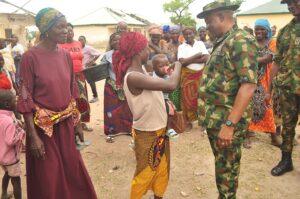As dark clouds gather over Taraba State, heralding the start of the rainy season, they bring with them more than just the promise of water for crops. They also stir a familiar unease and anxiety that farmlands and grazing routes may once again become battlegrounds for farmers and herders.
But this year, alongside the rains, a quiet campaign for peace is unfolding; one not marked by sirens or gunfire, but by handshakes, dialogue, and understanding.
Leading this effort is Brig. Gen. Kingsley Uwa, Commander of the Nigerian Army’s 6 Brigade and Sector 3 of ‘Operation Whirl Stroke’ (OPWS).
Over the course of a week, Brig. Gen.Uwa has embarked on a determined tour of three high-risk local government areas of Ardo-Kola, Karim-Lamido, and Lau, meeting with traditional rulers, youth leaders, religious figures, and local government officials. His mission is clear: to prevent conflict before it ignites and to lay the groundwork for lasting peace.
Described by the military as a “non-kinetic operation,” the initiative is part of a broader shift in strategy by the Nigerian Army, placing emphasis on community engagement, persuasion, and partnership rather than force alone. It is a timely intervention in a region where the rainy season often signals heightened competition for land and resources and, too often, bloodshed.
In a statement issued by Acting Public Relations Officer Capt Oni Olubodunde, the brigade revealed that the tour began at the Ardo-Kola Local Government secretariat. There, Brig. Gen. Uwa met with the council Chairman, Zakari Ismail and other stakeholders to explore how early warning systems could be enhanced and how civilians and security agencies could cooperate more effectively to prevent violence.

However, the urgency of the mission came into sharp focus during subsequent meetings in Jalingo with leaders from the Bandawa, Munga, and Fulani communities of Karim-Lamido. These discussions came in the shadow of a recent deadly clash that left several dead and displaced dozens, now seeking shelter in an IDP camp in Lau.
Against this sobering backdrop, participants engaged in open, and at times emotional, dialogue. The outcome: a collective commitment to sign a formal peace accord in the coming days a symbolic and practical step toward de-escalation.
In Lau, the final leg of the tour, Brig. Gen. Uwa joined forces with council Chairman, Nigeria Jatau, alongside religious and community leaders, to focus on rebuilding trust between communities, fostering preventive dialogue, and developing collaborative security structures.
Related Articles:
- Police nab two suspects, seize six firearms in Taraba Operation
- Again troops neutralize bandits, recover 1,000 rustled cattle in Taraba
At each stop, the brigade commander drove home a consistent message: “No meaningful development can occur in an atmosphere of conflict,” he told attendees. “We are committed to peace, but let it be clear that the military will not tolerate any group or individuals bent on destabilizing the region.”
His message struck a chord. Local leaders praised the commander’s inclusive approach and recalled similar efforts from the previous year, which many credited with reducing dry-season tensions. They described his leadership as people-centered, proactive, and refreshingly engaged.
What sets this peace initiative apart is not merely its military logistics, but its moral architecture, the belief that peace is not something that can be enforced from above but must be cultivated at the grassroots, through conversation, empathy, and mutual respect.
As Taraba enters its most agriculturally intense season, the success of Brig. Gen. Uwa’s mission can be measured not only in reduced violence, but in increased trust a harvest of harmony that may prove just as vital as any yield from the soil.
For now, the 6 Brigade, stands alert armed not only with weapons, but with words, compassion, and a vision of peace that goes beyond uniform and command.